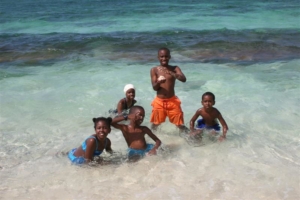COVID-19’s Impact on Poverty in the Bahamas
 A tourism-dependent country, the Bahamas was hit hard by international travel restrictions and lockdown policies put in place due to the outbreak of the COVID-19 pandemic. As a result of the pandemic, the island nation has recorded an estimated $9.5 billion in losses between 2020 and 2023, according to the Inter-American Development Bank (IDB). Furthermore, a recent report published by the IDB and the Economic Commission for Latin America and the Caribbean (ECLAC) shows that the pandemic continues to have a lasting impact on the Bahamian tourism sector and the overall economy.
A tourism-dependent country, the Bahamas was hit hard by international travel restrictions and lockdown policies put in place due to the outbreak of the COVID-19 pandemic. As a result of the pandemic, the island nation has recorded an estimated $9.5 billion in losses between 2020 and 2023, according to the Inter-American Development Bank (IDB). Furthermore, a recent report published by the IDB and the Economic Commission for Latin America and the Caribbean (ECLAC) shows that the pandemic continues to have a lasting impact on the Bahamian tourism sector and the overall economy.
With many Bahamians still experiencing heightened financial hardship and diminished access to vital necessities, the World Bank estimated that the country’s poverty rate could rise to more than 13%, returning the poverty rate to roughly what it was in 2013. Fortunately, the Government of the Bahamas has been working to mitigate the pandemic’s social and economic impacts and speed progress toward recovery.
Dwindling Tourism, Employment Rates and Incomes
Tourism accounts for about 50% of the Bahamas’s Gross Domestic Product (GDP) and about 70% of jobs in the country. With an estimated $7.9 billion of the country’s total losses for 2020-2023 occurring in the tourism sector, the sharp decline in tourism had a detrimental impact on employment and livelihoods, driving many families into poverty. For instance, between 2019 and 2020, the country’s unemployment rate rose from 10.7% to 25.6%. Additionally, “The fraction of households reporting earnings below the minimum wage more than doubled between January and April 2020,” according to the IDB. The IDB anticipated that “aggregated losses in wages of employees and workers” would “reach $2.4 billion for 2020-2023, or 4.9% of GDP per year on average.” This has coincided with an estimated loss of about 30,000 jobs or about 14.7% of the labor force.
The joint IDB-ECLAC report also highlights that COVID-19’s impact on poverty in the Bahamas has been particularly noticeable among rural and marginalized communities, exacerbating already-restricted access to health care, education and other vital services. Moreover, a lack of dependable internet connectivity and digital infrastructure has hampered remote learning and access to online employment opportunities.
Government Action
COVID-19’s impact on poverty in the Bahamas prompted government action. In 2020, the Government of the Bahamas partnered with local non-governmental organizations to address pandemic-induced hunger and establish the National Food Distribution Task Force. The emergency task force distributed food vouchers and packages to endangered households throughout the country, delivering critical assistance to more than 76,000 Bahamians in need by June 2020.
Social Protection Programs
The Bahamian government also introduced the Unemployment Assistance Program (UEA), which the National Insurance Board (NIB) of the Bahamas adopted in April 2020, to supply social protection for informal workers. The UEA provided targeted aid for three particularly vulnerable groups:
- Government-registered self-employed individuals.
- Public transport drivers who had no business license but did have “a public service drivers’ badge.”
- Self-employed individuals in the tourism sector who had no business license but “could provide proof of work.”
Members of these groups received weekly payments of BSD200, equivalent to about $200, for 13 weeks to alleviate income loss during the lockdown. In July 2020, the UEA was extended to also provide lost income subsidies for self-employed individuals in the tourism sector who were not able to work due to the decline in tourism.
Looking Ahead
While, as a result of COVID-19, the Bahamian tourism sector recorded losses of around 61.22% in 2021, this number is expected to drop to 1.35% by 2024. As the country’s economy continues to recover, the government’s efforts to alleviate COVID-19’s impact on poverty in the Bahamas remain significant. Looking ahead, there is equally hope for further investment in diversifying the country’s economy, building resilience and creating new sustainable livelihood opportunities.
– Nathaniel Scandore
Photo: Flickr
